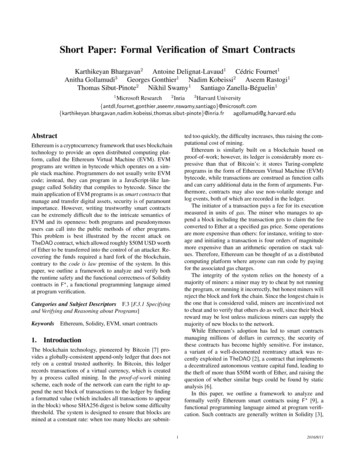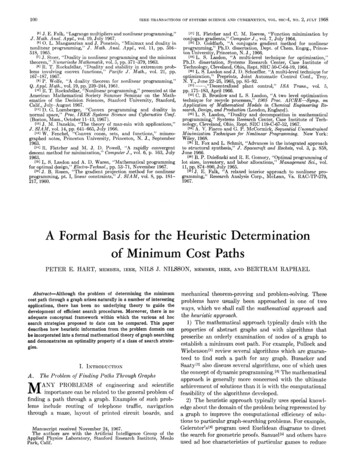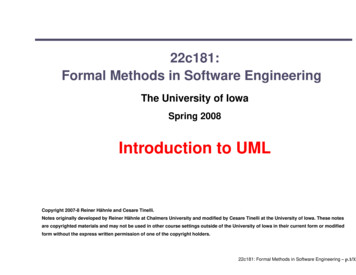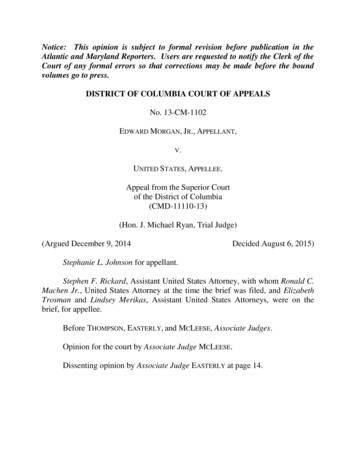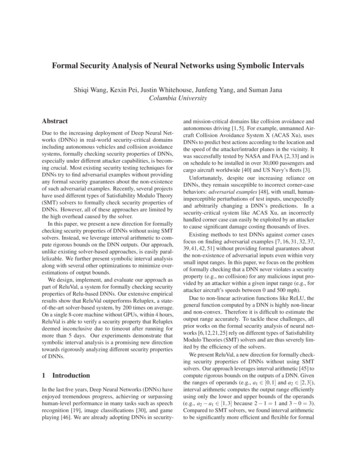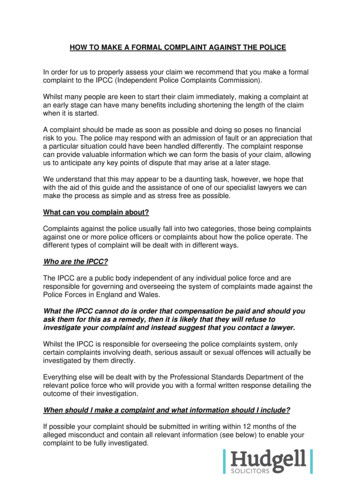
Transcription
HOW TO MAKE A FORMAL COMPLAINT AGAINST THE POLICEIn order for us to properly assess your claim we recommend that you make a formalcomplaint to the IPCC (Independent Police Complaints Commission).Whilst many people are keen to start their claim immediately, making a complaint atan early stage can have many benefits including shortening the length of the claimwhen it is started.A complaint should be made as soon as possible and doing so poses no financialrisk to you. The police may respond with an admission of fault or an appreciation thata particular situation could have been handled differently. The complaint responsecan provide valuable information which we can form the basis of your claim, allowingus to anticipate any key points of dispute that may arise at a later stage.We understand that this may appear to be a daunting task, however, we hope thatwith the aid of this guide and the assistance of one of our specialist lawyers we canmake the process as simple and as stress free as possible.What can you complain about?Complaints against the police usually fall into two categories, those being complaintsagainst one or more police officers or complaints about how the police operate. Thedifferent types of complaint will be dealt with in different ways.Who are the IPCC?The IPCC are a public body independent of any individual police force and areresponsible for governing and overseeing the system of complaints made against thePolice Forces in England and Wales.What the IPCC cannot do is order that compensation be paid and should youask them for this as a remedy, then it is likely that they will refuse toinvestigate your complaint and instead suggest that you contact a lawyer.Whilst the IPCC is responsible for overseeing the police complaints system, onlycertain complaints involving death, serious assault or sexual offences will actually beinvestigated by them directly.Everything else will be dealt with by the Professional Standards Department of therelevant police force who will provide you with a formal written response detailing theoutcome of their investigation.When should I make a complaint and what information should I include?If possible your complaint should be submitted in writing within 12 months of thealleged misconduct and contain all relevant information (see below) to enable yourcomplaint to be fully investigated.
You should include the following information: Your full name and address. The name of the Police Force you wish to be subject to the investigation. Details of the allegations and complaints you are making together with theoutcome you are seeking. For example, specific officers to be disciplined. Details of why you feel the Police have acted inappropriately or outside theirpowers and what you would have expected them to have done differently.Common examples of misconduct that you may have been subjected toinclude:- -Being wrongfully arrested and detained in police custody.-The feeling that you may have been detained in custody longer then wasnecessary for the police or Crown Prosecution Service to charge, bail orrelease you.-Being assaulted by a member of the police.-You were prosecuted but you either won the case or it was discontinuedand you now consider or did at the time of the initial charge, that thepolice never had any real reason to suspect you were guilty butattempted to build and bring a case against you anyway.-A failure by the police to properly investigate allegations against anindividual leading to you or family members suffering harm at the handsof that individual at a later date.A list of any specific questions you would like them to answer.Attached for your assistance is a simple example of how to set out your complaint.Please be aware that the scenario set out in the example is fictitious.When you have finished your draft complaint, one of our specially trained lawyerswould be more than happy to consider the content and provide additional assistanceprior to sending the final copy to the IPCC.If this is a service you consider you may benefit from please email a copy topolicecomplaints@hudgellsolicitors.co.ukOnce we have considered your complaint and you are a happy with ourrecommendations please forward a copy to:
enquiries@ipcc.gsi.gov.ukAlternatively you may wish to post a hard copy to:Independent Police Complaints CommissionPO Box 473SaleM33 0BWWhat will happen next? When will I received a response?Once the complaint has been lodged, the IPCC will provide you with an initialacknowledgement.If the decision is made to refer it to the Professional Standards Department you canexpect a response within 15 working days as to whether or not the complaint is to beinvestigated, together with the reasons for the decision and how it is to beinvestigated.Regardless of whether the IPCC decide to refer your complaint to the ProfessionalStandards Department there is always the chance that once they have reviewed itfurther, it may become apparent that due to the serious nature of the allegations areferral back to the IPCC is required.If the Complaint is dealt with by the IPCC what are the potential outcomes? The IPCC has its own investigators who carry out independent investigations. The investigation carried out will involve taking witness statements from policeofficers or members of police staff, analysing CCTV footage and obtainingother documents and records. They may also wish to take a statement fromyou as well. If they do, we recommend you send the draft statement to usbefore signing it so we can consider the contents. At the end of the investigation you will be provided with a report which will setout the findings and conclusions. It will also include a clear indication as towhether there is a case to answer for misconduct or poor performance. Ifthere is a suggestion that a member of the police has committed a criminaloffence the report will also be forwarded to the Crown Prosecution Servicewho are responsible for deciding if a person should be prosecuted. In the unfortunate event that your complaint against the police was in relationto a death and an inquest is to be held the IPCC will also provide their reportand evidence to the Coroner to be considered at the inquest.If the complaint is to be dealt with by the Professional Standards Departmentwhat are the potential outcomes I can expect?
There are two levels of investigatory procedures that the police force subject toinvestigation may consider employing. The procedure followed will depend on thenature of the allegations and if proved the element of redress available to them.The two levels of investigatory procedure are:1)Local resolution Some complaints do not require IPCC intervention and whilst this is thesimplest way to resolve a complaint, it is not a reason to believe that themisconduct you are complaining about is any less serious and may in factresult in the police force explaining, apologising or advising on additionaltraining requirements. As you cannot appeal against the result of a Local Resolution if you disagreewith the end result, you must be asked whether you agree to localresolution before it can go ahead. You cannot be compelled to use thisprocedure, and should not feel under any obligation to do so. If youconsider that you are being pressured into this method of redress,please do not hesitate to contact us and we will be more than happy toadvise further.2)Local investigationShould you refuse to have you complaint dealt with by way of local resolution thenthe Professional Standards Department will appoint an officer to investigate yourcomplaint. You will be told how your complaint is to be investigated, what is requiredfrom you, how a decision is to be reached and the eventual action to betaken. The investigation may conclude that the officers subject to complaint shouldbe dealt with by way of misconduct proceedings. You will be contacted withdetails of these proceedings and will be offered the chance to appear beforea panel chaired by a legally-qualified professional together with the officersubject to the misconduct charge also being in attendance. If there is afinding of gross misconduct the strictest penalty that may be levied againstthe officer subject to complaint is that he will be dismissed from the policeforce.What will be taken into account when investigating an officer?An officer under investigation will be tested against the Standards of ProfessionalBehaviour. These would include the following:-
Has the officer acted honestly and with integrity and not abused their position. Has the officer acted with self-control and respect when dealing with thepublic? Has he or she acted with fairness and impartiality? If force has been used, was it necessary, reasonable and proportionate,taking into account all the circumstances. Police officers should be diligent in the exercise of their duties and shouldensure they are fit to carry out their responsibilities. An officer should treat information with respect and should only access ordisclose it in the proper course of their duties. Officers are to only give and carry out lawful orders and are to abide by thoseorders and other police regulations and policies. Has any officer behaved in such a way as to discredit the police service orundermine public confidence either whilst on or off duty.Can I appeal the Professional Standards Departments findings following eithera Local Investigation?You can appeal to the IPCC in the following circumstances: You have a grievance with the outcome of the investigation You have not received enough information about the findings of theinvestigation and the action the police plan to take or; If the police have not followed the process you agreed to.The letter telling you the outcome of your complaint should includeinformation about how to appeal and the time limits involved. It is importantthat you lodge any appeal within the time limit provided otherwise your appealmay not be considered. Before you do so we strongly recommend that youcontact us so that we can review the letter and advise as to points that couldor should be appealed.How often will I be updated and when am I likely to receive a response? You will be contacted at an early stage of your complaint by the nominatedinvestigating officer.
After this you will be updated at least every 28 days via the medium of yourchoice e.g. letter or email. Please be aware that there is currently no limit on the length of time forany investigation regardless of who is nominated to deal with yourcomplaint and how. However we do expect that once your complaint hasbeen acknowledged and assigned to someone an indication should be givento you as to how long the investigation is likely to take. If for whatever reason you are dissatisfied during the investigations pleasefeel free to contact one of our specialist lawyers who may be able to advisefurther.Complaints about how the police operateIf the complaint is not about an officer then it will be dealt with as what is known as a“direction and control” matter. Complaints within this category usually relate to policepolicies and procedures and do not usually lead to payment of damages. Anexample would be the implementation of a stop and search policy.The complaint will be dealt with by an officer at the station involved rather than bythe IPCC. The police have more flexibility as to how they deal with the complaint butthe process will be similar in that an investigation will take place and you will beinformed of the outcome.What should I do when I receive the response to my complaint?When you are in receipt of a final written response, we kindly ask that you contact uswith a copy of the same for us to review so that we may assess the prospects of asuccessful civil claim.Should you have any queries in relation to making a complaint, please do nothesitate to contact us where will be more than happy to advise further.
police never had any real reason to suspect you were guilty but attempted to build and bring a case against you anyway. - A failure by the police to properly investigate allegations against an individual leading to you or family members suffering harm at the hands of that individual at a later date. A list of any specific questions you would like them to answer. Attached for your assistance is .


